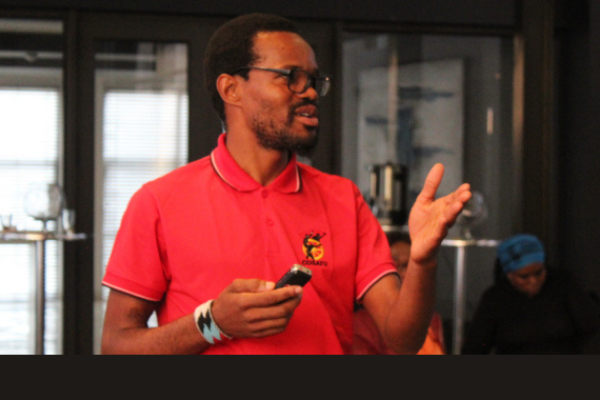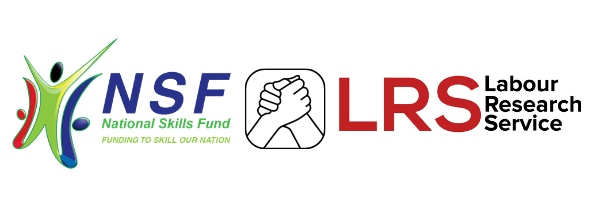In 2019, the Labour Research Service (LRS) partnered with 29 worker leaders to create a negotiator’s guide for working-class leaders – shop stewards, organisers, and negotiators – who aim to organise and advocate for workers in an evolving world of work. This peer learning initiative, supported by the National Skills Fund, is part of a broader LRS project focused on promoting informed social dialogue by addressing information and skills disparities in collective bargaining. Bongani Mkhize, a shop steward from SACCAWU (pictured), took part in our peer learning process and shared insights on organising young workers and negotiating at work.
"What is most effective in engaging and empowering young workers to join unions and advocate for their rights in the workplace?"
Firstly, I want to challenge the stereotype that young people are individualistic and indifferent to workplace concerns. Many young workers in South Africa are well-educated and grasp labour issues, and they don’t necessarily harbour negative views about unionism. Many young workers lack knowledge about trade unions and don’t trust them. They think unions are irrelevant today and too political. However, raising awareness about labour rights is the initial step. I think many young non-union members lack effective ways of asserting their rights. When people try to solve problems within their social groups, they often face frustration. Unfortunately, this approach rarely leads to positive outcomes.
Many young workers in South Africa understand labour issues and are not particularly negative about unionism. Rather they just don’t know very much about trade unions and so generally mistrust them.
Organising young people is challenging because they have their perceptions of unions. The encouraging aspect is that unions have the potential to influence these perceptions. One approach is to revisit the fundamental principles of trade unionism. Additionally, we must recognise that the nature of the workplace is evolving and requires us to adapt accordingly.
I am a shop steward representing workers in the hospitality sector, which has grown significantly. Despite being labour-intensive and providing employment to over half a million individuals, many jobs are flexible. The sector jobs categories include permanent, scheduled, and casual positions. My union, the South African Commercial, Catering and Allied Workers Union (SACCAWU), opposes certain employment models, and the prevalent low wages and irregular shift and night work patterns typical in the sector.
I am committed to organising young people and assisting them in addressing their concerns. While our union has successfully organised some young workers in newly established businesses, we face numerous challenges. For instance, during a recent strike called after wage negotiations stalled, workers at one company could not participate due to a lack of solidarity.
How can employers encourage young workers to take advantage of learning opportunities, and how can unions help?
I grew up in a rural area where my mother worked as a domestic worker for 35 years. She instilled the importance of education and worked hard to ensure I received schooling. Unfortunately, I had to abandon my university studies due to financial constraints. However, I didn’t let that setback stop me. I secured a job and enrolled in college to continue my education. Last year, we successfully negotiated study loans and bursaries for employees at my company. Despite this victory, the uptake has been disappointingly low – only 10 people applied in 2018, and this year, only five did. It’s crucial for union officials, especially, to pursue opportunities for ongoing education. I’ve encountered stewards who struggle to communicate with employers about basic issues like enforcing the BCEA, perhaps because they lack literacy skills or are simply uninformed. How can stewards effectively advocate for workers if they’re not well-versed in relevant labour laws and rights?
My most important advice to young workers is to learn continuously. Knowledge and information empower individuals with the ideas and confidence to challenge employers. With smartphones and the Internet widely accessible in our country, information is literally at our fingertips. So why aren’t we taking advantage of it? I’ve witnessed a colleague who never attended school decide to enrol and is now preparing to take his Matric exams this year. The transformation and newfound confidence in his life are evident. There’s no excuse for ignorance.
Drawing from your experience, what advice would you offer to an emerging union shop steward looking to excel in their role?
When I first joined the National Union of Metalworkers of South Africa (NUMSA), I was fortunate to have a mentor who guided me through the ropes. The union focuses on education and ensures that new officials receive training. Effective negotiators must be avid readers, diligent researchers, analytical thinkers, and listeners. Over time, I have honed these skills and continue to refine them because learning never ends. Read and research topics including the economy and your sector, the workings of your company, prevailing working conditions, past collective bargaining agreements, and the latest statistics on inflation and wages. Seek guidance from comrades and industry experts. Never underestimate the power of reading.
Workers often struggle when faced with complex information. How do you overcome this challenge?
I turn to my comrades and experts for guidance when confronted with complex information. I must effectively communicate the issues to all workers, regardless of their literacy levels. Take, for instance, the disciplinary proceedings at our workplace. Some workers facing disciplinary actions struggle to grasp the proceedings and the underlying issues. The shop steward is responsible for explaining these proceedings in a language that workers can understand. Companies present information solely in English, which can be a deliberate tactic. Companies should translate key documents and communications into languages and formats accessible to all workers. At the grassroots level, we promote basic technology skills among workers, such as using email and accessing resources online.
How are unions adapting to represent their members in a changing world of work?
While some union officials express concerns about the impact of the Fourth Industrial Revolution on employment, I, as a younger worker, see the potential of technology to enhance labour practices. Embracing technology can streamline tasks and improve efficiency in the workplace. However, unions need to have strategies to ensure that the evolving needs of workers are considered as companies adapt. There’s a risk that some employers may seek to marginalise labour in this process. We must recognise that technological advancements may not necessarily lead to job losses; they may also create new opportunities and necessitate skill development. Therefore, ongoing discussions about the Future of Work and the Fourth Industrial Revolution are vital for shaping our approach to these issues.








